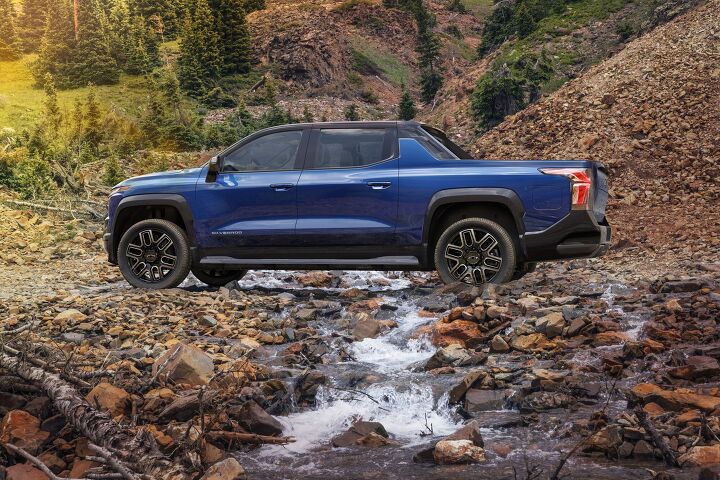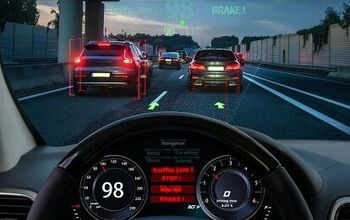Chevy Detailed a Longer Range and Lower Price for the Silverado EV RST

Chevrolet is readying deliveries of the Silverado EV RST, and the truck’s already impressive specs just got a boost. The automaker now states a range of 440 miles for the luxurious electric pickup, increasing the originally advertised 400-mile range. That makes it almost as robust as the more stripped-down 4WT (Work Truck) trim, which boasts a 450-mile driving range.
Chevy’s new range estimates give the Silverado EV an edge over all its competitors, including the Ford F-150 Lightning, Rivian R1T, and Tesla Cybertruck. The automaker’s numbers aren’t exaggerated, either, as recent tests by the media, including Zack Nelson from the YouTube channel JerryRigEverything, show that they’re conservative, if anything.
Though stout on specs, the new truck is far from cheap. The Silverado EV RST First Edition starts at a healthy $96,495 after a $1,995 destination charge, though that’s almost $10,000 less than Chevy originally advertised. It’s still a far cry from affordable, but it is more than the trucks' rivals’ starting prices.
Ford and Ram took a more traditional route with their electric trucks, opting to build vehicles that look and function similarly to their gas counterparts. The Silverado EV is a different animal, with a design reminiscent of the Chevy Avalanche pickup from several years ago. It’s still a capable truck with up to 10,000 pounds of towing capacity, but the look is radically different from the gas-powered Silverados we have today.
Chevy hasn’t shared many other details on the pickup, but we’ll learn more in the coming weeks as it nears its on-sale date. Cheaper versions will come later, though there’s no firm word on when other variants will hit the market.
[Image: Chevrolet]
Become a TTAC insider. Get the latest news, features, TTAC takes, and everything else that gets to the truth about cars first by subscribing to our newsletter.

Chris grew up in, under, and around cars, but took the long way around to becoming an automotive writer. After a career in technology consulting and a trip through business school, Chris began writing about the automotive industry as a way to reconnect with his passion and get behind the wheel of a new car every week. He focuses on taking complex industry stories and making them digestible by any reader. Just don’t expect him to stay away from high-mileage Porsches.
More by Chris Teague
Latest Car Reviews
Read moreLatest Product Reviews
Read moreRecent Comments
- Mebgardner That's not what I'm talking about, and you know it.
- FreedMike "“Everything is on the table,” the letter said." How about making stuff that doesn't fall apart and cost twice as much to fix after the fact? Those recalls ain't free.
- The Oracle Apple is responding to consumer feedback and biometric trends.
- MaintenanceCosts Tariffs inevitably hurt the consumers of the nation imposing them. There are policies other than tariffs that can support the development of healthy trade without bottom-feeding... ... if, and only if, the other trading partners are operating in good faith.Tariffs may be the right response, notwithstanding the pain we impose on ourselves with them, if the trading partner is actively trying to exploit or damage us.I suspect we could probably compete without tariffs or with a smaller tariff in this particular market, but it's hard to ignore the Chinese government's complicity in allowing the business sector to steal and exploit our IP.
- EBFlex EVs are dangerous enough but a cheap China made one is far worse. Anything that helps keep them off our roads is a good thing.

































Comments
Join the conversation
Can't get behind these EV 1/2 ton PU's with HUGE battery packs.
Too expensive
Too heavy
Questionable resale value
Terrible for commuting
Not good for towing or even road tripping, especially when venturing into rural areas during cold weather.
Bad for the environment.
Nice personal attack. I'd report it but nothing would be done as this website is obviously hard up for commenters which is why people like you & others I won't mention are allowed to still be on it.
With current battery tech & charging infrastructure a full size PU is absolutely the worst type of vehicle to power with batteries except in a commercial setting. That is the truck market automakers should be targeting while developing this technology.
As of today, battery vehicles do not scale well, The carbon footprint of these EV trucks may have a slight edge over a gasser but it isn't enough to bother width, so regardless they are still bad for the environment until a better battery is engineered.
Currently EV's make sense mostly as a 2nd or 3rd commuter vehicle for multi-car families that can charge at home. That's a huge market & there's a few of us on this website including myself. Sure there are people that can make them work as their primary vehicle, but that's a much smaller market.